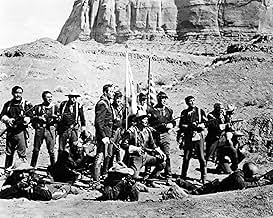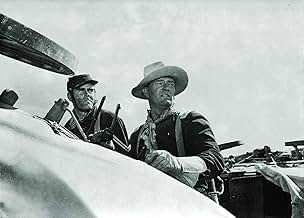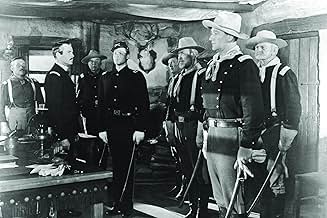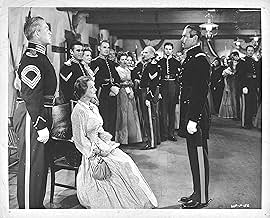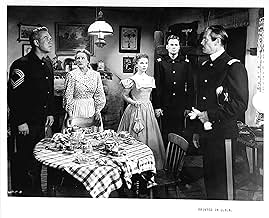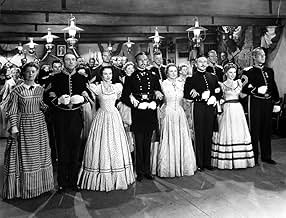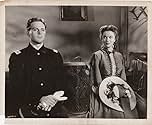In Fort Apache gerät ein erfahrener Captain auf einen Konflikt, als sein Regiment unter das Kommando eines jungen Lieutenants gestellt wird, der den hiesigen Indianerstamm nicht achtet.In Fort Apache gerät ein erfahrener Captain auf einen Konflikt, als sein Regiment unter das Kommando eines jungen Lieutenants gestellt wird, der den hiesigen Indianerstamm nicht achtet.In Fort Apache gerät ein erfahrener Captain auf einen Konflikt, als sein Regiment unter das Kommando eines jungen Lieutenants gestellt wird, der den hiesigen Indianerstamm nicht achtet.
- Regie
- Drehbuch
- Hauptbesetzung
- Auszeichnungen
- 2 Gewinne & 1 Nominierung insgesamt
- Sgt. Beaufort
- (as Pedro Armendariz)
- Cochise
- (as Miguel Inclan)
- Cavalryman
- (as Philip Keiffer)
Empfohlene Bewertungen
The headstrong commander refuses to listen to the advice of his loyal captain, Kirby York, who knows frontier life and enjoys a rapport with the indian chiefs. The two officers are both strong characters, and their differing ideas inevitably lead to a clash.
Cochise and his braves are willing to accommodate the white man so long as their concerns are handled with diplomacy. Unfortunately, the high-handed approach of Lieutenant-Colonel Thursday cause relations to deteriorate, and conflict ensues.
In the course of the 1940's and 50's, director John Ford returned repeatedly to this subject-matter, John Wayne in Monument Valley with the US cavalry, fighting redskins and singing Irish folksongs. The stirring anthem in this movie is "The Girl I Left Behind Me", sung as the regiment rides out in full panoply to meet Cochise - although "She Wore A Yellow Ribbon" gets an airing, too.
The cavalry regiment itself is a protagonist in the story, regarded as a living entity by its members. When Captain York is promoted to Colonel and commands the regiment, he makes a powerful speech stressing the continuity and tradition which have made the regiment great. The sense of hierarchy is strong. This is a world of order in which army regulations govern even the way an officer presents his calling-card. Soldiers can quote the regulations by heart. This well-regulated military force will, we feel, impose civilisation on this wild frontier.
Examples of the regiment's rigid code keep recurring. The NCOs' dance has its own elaborate protocol, which not even Colonel Thursday dares to flout. Feelings over the O'Rourke marriage reach boiling-point, but everyone adheres to the rules of military courtesy. Washington's Birthday is celebrated as a regimental occasion. The Irish sergeants are all related by blood and marriage, and as their exuberant fraternal greetings subside, military discipline asserts itself effortlessly.
"I'm not a martinet," protests Colonel Thursday, the most extreme martinet imaginable. He is inflexible in his enforcement of the military code, and too stubborn and wrongheaded to listen to the advice of his officers, who are experienced frontier campaigners. He completely misses the presence of Cochise's war party because he has no combat experience and doesn't know to watch the skyline for dust clouds. In addition, Thursday is a terrible snob. He calls young Michael O'Rourke a 'savage' for a perceived laxity of discipline, and sets his face against the marriage of Michael and Philadelphia because of "the barrier between your class and mine". He is dismayed that the son of a sergeant should have passed through West Point, and needlessly offends Cochise by talking down to him.
And yet even Owen Thursday has a human side. We gather that there is some personal secret between him and Captain Collingwood, and we almost smile when the armchair collapses under him. Most tellingly, Thursday returns to the beleaguered redoubt after he has been rescued. He redeems himself by rejoining his soldiers in the thick of the fighting.
When young Philadelphia Thursday (Shirley Temple) studies Michael O'Rourke in her purse mirror, we know that these two will be the love interest. Also, as this incident illustrates, the womenfolk of Fort Apache tend to run the show in this masculine enclave. The Thursday residence is somewhat joyless, especially when compared with Aunt Emily's cosy quarters. The women brush aside the colonel's seniority and call in Mrs. O'Rourke to refurnish the place. In one of the film's good jokes, no fewer than eight Mrs. O'Rourkes answer the call. There is a touching scene when the regiment moves out and the women are left together. Mrs. Collingwood is torn, because her husband has his safe posting back east and needn't go into battle, but she knows how important it is for him to prove his courage. The womenfolk urge her to call him back, but she reluctantly allows him to ride out.
John Ford laced many of his films with Irish humour, and "Fort Apache" is no exception. The ubiquitous Victor McLaglen plays Sergeant Festus Mulcahy, and he and the O'Rourkes run the fort - that is, whenever they are not in the jailhouse on charges of drinking and brawling. Outrageously, Mulcahy promotes a raw recruit to corporal, simply because he's Irish. Quincannon virtually lives in the jailhouse, but he has a fine tenor voice, so he is released from custody in order to serenade the young lovers with his rendition of "Genevieve". When the dishonest trader Meacham has his whisky stock confiscated and marked for destruction, the sad faces of the sergeants make a comical picture, and the subsequent 'destruction' is even funnier.
Ford is a master of composition. York rides out to parley with Cochise and is engrossed in dialogue, leaving Thursday stranded and excluded. We hear the thunder of hooves offscreen before we see the charge, and its impact is magnified accordingly. In the sequence where York and Beaufort ride to negotiate with Cochise, the screen is filled with stunning images of rock and sky. The charging cavalry are cleverly 'lost' in their own dust, which closes behind them like a curtain, ending the scene.
Wayne is curiously subdued in this film. This is partly because he plays a conscientious subordinate, and partly because the confrontation with Fonda is eclipsed by other plot developments.
Henry Fonda's Lt.Col. Owen Thursday is a complex, driven man, a martinet who considers his transfer to the western outpost as a slap in the face by the War Department. Accompanied by his daughter, Philadelphia (a grown-up and vivacious Shirley Temple), he arrives at Fort Apache early, and discovers the welcoming festivities are not for him, but for the return of the son of Sgt.Major O'Rourke (Ward Bond), a new second lieutenant, fresh from West Point. The younger O'Rourke, portrayed by John Agar, and Philadelphia are immediately attracted to one another (they were married, off screen), but, displaying a 'class' snobbery, Col. Thursday nixes any chance of an officer's daughter and an enlisted man's son (even if he is an officer) having a romance.
As the new commander, Thursday shows an insensitivity to both his own men (he rebukes former commander Capt. Collingwood, played by George O'Brien, in front of the other officers), and the intellectual and tactical skills of the Indians (drawing the ire of John Wayne, as Capt. Kirby York). He does convince York that he is interested in parlaying with Cochise, however, and soon York, whom the chief respects, is on his way to Mexico, to get him to cross the border for a meeting between the two leaders and the corrupt Indian agent (Grant Withers) whose actions had led to the current insurrection.
Ultimately, Cochise does cross the Rio Grande, and Thursday reveals his true plan; to demand a return to the reservation, or face annihilation. York feels betrayed, and warns Thursday that he's setting himself up for a massacre, especially as the commander intends to bring his entire command to the meeting. Thursday simply sneers at his warning, sarcastically suggesting that York is crediting Cochise as being as brilliant as Napoleon.
The meeting is brief, with Thursday showing no respect, and, sure enough, ends disastrously. Cochise, prepared for a potential betrayal, has lined the canyon walls beyond the meeting place with hundreds of sharpshooters, and, despite York's warnings (leading to his being branded by Thursday a 'coward', and ordered to remain with a rear guard), the Colonel leads his command in a charge, into the canyon...
In an unsympathetic role, Henry Fonda is marvelous, actually making Col. Thursday believable, if not likable. John Wayne, despite star billing, is actually secondary, plot-wise, but is excellent as the officer who learns, finally, what it means to command, by watching the wounded Thursday return to his command, and face certain death.
Major subplots of all three 'Cavalry' films would be devoted to Sergeants, and FORT APACHE offers four truly memorable ones, in Bond, Pedro Armendariz, Victor McLaglen, and Dick Foran.
FORT APACHE is a film that could easily stand alone as a superb drama; as the first of the trilogy, it set a high standard, and is considered by most critics as the finest of the three films.
It is unforgettable!
Fort Apache is a lonely US army outpost in the years after the Civil War. Nothing much happens there, and it's not a particularly prestigious assignment. The officers and men are comfortable and unchallenged under the command of Wayne's Captain York. Things change when Fonda's Col. Thursday shows up to assume command. Thursday is a bitter character. He thinks he's better than Fort Apache, and he resents being assigned to the command. You get the impression that he was a well regarded Union officer in the Civil War who just got overlooked in peacetime. But he's an officer, and Fort Apache is his assignment and he's determined to make it the best outfit in the US Army. No more comfortable outpost. The men wear proper uniforms, they drill, they train. Thursday's awkward in the command. Fort Apache is a close knit post, and he just doesn't fit in. His interactions with the soldiers and other officers are stiff and formal. Wayne's relaxed York and Fonda's by the book Thursday make this an interesting character study more than a western for the most part.
For all his attention to detail, though, Thursday has a basic problem: he yearns for glory, and he's not especially competent. Given the chance he orders his men to attack a group of Apaches returning from Mexico who've been promised by York that they could negotiate. But Thursday wants to beat them in battle and make his name, over York's protests. Not surprisingly, the end result is not unlike Custer's Last Stand.
This is a character study, and the characters are strong. It's not only Wayne and Fonda. There are other good performances in this as well. I was quite taken with the very pretty 20 year old Shirley Temple as Thursday's daughter. Interestingly, her love interest in the movie is played by John Agar, her real life husband at the time. Ward Bond was also very good as Sgt. Maj. O' Rourke. The battle scenes are restricted to the last half hour or so, and they serve primarily to show Thursday making blunders and rejecting the advice of those who know the Apache better than he does. The last scene of the movie is the classic example of a manufactured hero. Killed by the Apache after his own incompetence doomed him, Thursday is turned into a gallant national hero. York assumes command of Fort Apache, but the portrait of Thursday hangs over him. Those we recognize as heroes aren't always the real heroes apparently.
It's a well done movie. If you're expecting a traditional cowboy and Indian shoot out, you won't find it here. BUt it has a few humorous moments, and if you're looking for a solid, character driven western featuring two very good actors, Fort Apache will definitely satisfy. (7/10)
It's first and foremost the story of a clash between two men who see the United States Army in very different terms. Fonda is a former general who's seen glory in the Civil War, but has been shunted aside. He wants to get back on top in the worst way. He's exiled to Fort Apache in the Arizona territory while the big headlines concerning the Indian wars are going to the campaign against the plains Indians which was true enough.
Wayne has also seen some glory in the Civil War. But he's a professional soldier and just wants to live long enough to retire. In fact Ward Bond who is the sergeant major at the post has also dropped down in rank, he was a major in the Civil War and a Medal of Honor winner. This was a common occurrence at the end of the Civil War. During the war, promotions came swiftly because of battlefield service. Something called a brevet rank was instituted a kind of temporary promotion. You could be a brevet brigadier general and have an actual rank of something like major. After the Civil War as the U.S. Army shrunk to its pre-war size, soldier reverted to previous ranks. This was something John Ford was keenly aware of when he made Fort Apache.
Ford's stock company was never better. Even minor bit parts are woven nicely into the whole story. And his photography of Monument Valley, it's beauty and vastness was never better even when he used color. Look at the scenes with John Agar and Shirley Temple riding and with Wayne and Pedro Armendariz on their way to parley with Cochise. Really great cinematography.
Ford had a couple of inside comments in the film. In a scene where Henry Fonda is getting an incomplete message from the post telegrapher, the telegrapher who might have strolled in from a Cagney-O'Brien film informs his commander that the message was interrupted "in the middle of the last woid." With both Irish and southern recruits in Fort Apache, a Brooklynese telegrapher would not have been out of place.
George O'Brien and Anna Lee, play Sam and Emily Collingwood who both knew Henry Fonda's Owen Thursday way back in the day. It's hinted that O'Brien had a drinking problem and that's why he's at Fort Apache, but he's looking for a transfer out. It comes as the regiment is moving out against Cochise.
Charles Collingwood was the second in command to Admiral Nelson at Trafalgar. Nelson became a British hero martyr, historians know about Charles Collingwood. When newspapermen at the end of Fort Apache remark about men like "Collingworth"not being remembered, it was John Ford making a statement about the worth of all the men who contribute their lives to defend their nations not just the leader heroes.
That remark by the way is the stage for one of John Wayne's finest acted scenes in his career. A soliloquy photographed through a cabin window about the life of the professional soldier, the camaraderie, the toughness, the bravery required of these men and how they deliver for their nation.
In a later film John Ford uses the line that in the west "when the legend becomes fact, print the legend." Henry Fonda's quest for martial glory was a blunder, but his story for the sake and tradition of his regiment is whitewashed and he becomes an inspiration.
Of course some of the lowbrow comedy that one expects from John Ford is here aplenty with the four drinking sergeants and their efforts to make soldiers out of the recruits. Led by Victor McLaglen, the quartet rounds out with Dick Foran, Jack Pennick, and Pedro Armendariz. See how they dispose of the contraband they are charged with destroying and its consequences.
Fort Apache also takes the side of the Indian here. Cochise played by an impassive Miguel Inclan is a figure of strength and dignity. Later on Jeff Chandler in another film brought speech to the dignity and that role launched his career. Cochise is the only true major figure in the film. He bedeviled the U.S. Cavalry for over a decade in Arizona Territory with guerrilla tactics Mao Tse Tung would have envied.
Fort Apache is a grand ensemble film and you will not be bored for one second in watching it.
This classic picture ranks as one of the best of John Ford's work. It contains Ford's usual themes as familiar feeling , a little bit of enjoyable humor, a community decided to build the civilization on a virgin territory , friendship and and sense of comradeship among people . Furthermore , ample shots on cloudy and nebulous skies , prairies and mountains filmed at Monument Valley and Professor Valley. Interesting screenplay portraying in depth characters and brooding events with interesting issues running beneath script surface is written by Frank S. Nugent based on a story by James Warner Bellah , booth of whom are John Ford's habitual . Spectacular scenes when the Apaches Indian-Chiricagua and Mezcaleros-spontaneously attack the unit in its last stand .
This excellent film featuring a magnificent performance by whole casting . Awesome John Wayne in a larger-than-life character . Enticing and intimate Shirley Temple , Irene Rich , Anna Lee in sensible roles with sensational performances . Excellent co-starring cast , introducing John Agar - subsequently remembered as the lieutenant in 'she wore a yellow ribbon' , here his first main role . Good cinematography by William H. Clothier and Archie Stout reflecting splendidly marvelous outdoors from mythical Monument Valley , a place that Ford was often to revisit and he befriends Indians tribes . Emotive and vivid score by Richard Hageman based on traditional music ; it contains a wonderful song that is sung on some touching scenes among sweet glances of John Agar and Shirley Temple . In the movie appears all habitual Ford's friends as War Bond , Dick Foran ,Jack Pennick , Hank Worden , Grant Withers , Jack Pennick , Guy Keebe, Pedro Armendariz and , of course , the great Victor McLagen as grumpy sergeant in charge of training the new recruits . The movie is stunningly produced by Merian C Cooper - Argosy Pictures Production- and magnificently filmed by Ford with direction assistant by Cliff Lyons . Avoid a horrible version shown in computer-colored . Rating : Very good, better than average.
Wusstest du schon
- WissenswertesThe cast member who had the hardest time with John Ford was John Agar, making his film debut. Whether it was because Agar was newly married to Ford's beloved Shirley Temple or because he wanted to test him, the director rode him mercilessly, calling him "Mr. Temple" in front of everyone, criticizing the way he delivered lines, chastising him for his lack of expert horsemanship. One day Agar stormed off, vowing to quit the picture, but John Wayne took him aside and helped him with some of the more difficult aspects of his job.
- PatzerAt 01:00:20 a small truck is seen on a road in the background, behind and to the right of the row of Apaches who are about to attack the repair wagon.
- Zitate
Lt. Col. Thursday: This Lt. O'Rourke - are you by chance related?
RSM Michael O'Rourke: Not by chance, sir, by blood. He's my son.
Lt. Col. Thursday: I see. How did he happen to get into West Point?
RSM Michael O'Rourke: It happened by presidential appointment, sir
Lt. Col. Thursday: Are you a former officer, O'Rourke?
RSM Michael O'Rourke: During the war, I was a major in the 69th New York regiment... The Irish Brigade, sir.
Lt. Col. Thursday: Still, it's been my impression that presidential appointments were restricted to sons of holders of the Medal of Honor.
RSM Michael O'Rourke: That is my impression, too, sir. Will that be all, sir?
- Alternative VersionenGerman version is cut to 92 minutes. It is not not known why the film was cut for the German market in 1948.
- VerbindungenEdited into John Ford - Der Mann, der Amerika erfand (2019)
Top-Auswahl
Details
Box Office
- Budget
- 2.500.000 $ (geschätzt)
- Weltweiter Bruttoertrag
- 11.928 $
- Laufzeit2 Stunden 8 Minuten
- Farbe
- Seitenverhältnis
- 1.37 : 1
Zu dieser Seite beitragen



